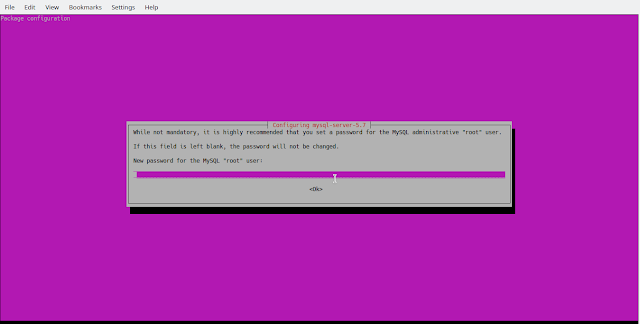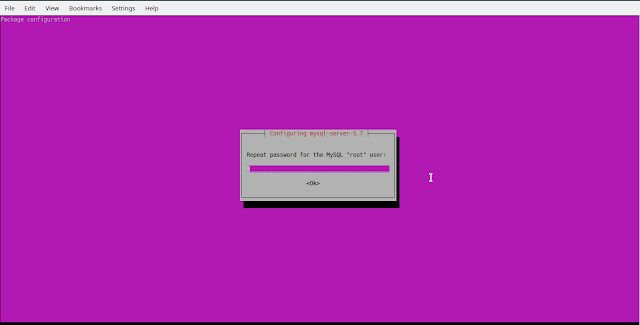මුල් ලිපි වලින් කිව්වා java install කරලා tomcat run කරන විදිහ. දැන් බලමු mysql install කරන විදිහ.
java install කරන විදිහ (කලින් ලිපිය මෙතනින් බලන්න )
tomcat run කරන විදිහ (කලින් ලිපිය මෙතනින් බලන්න )
මුලින්ම update කරන්න.
sudo apt update
mysql install කරන්න
sudo apt install mysql-server
password එක re-enter කරන්න.(කලින් කිව්වා වගේ common password නම් දෙන්නම එපා)
දැන් security script එක run කරලා configure කරන්න. මේකෙන් default secure options වෙනස් කරන්න පුළුවන් (like remote root logins and sample users)
mysql_secure_installation
මෙහෙම type කරලා Enter කරපු ගමන් පහල තියෙනවා වගේ list එකක් එයි, එක ඔයාට කැමති විදිහට Y or N යොදල වෙනස්කරගන්න පුළුවන්.
මෙතැනදී පුරුද්දක් විදිහට
root user ට හොද password එකක් දාන්න (2 = STRONG)
anonymous users ල remove කරන්න,
remotely root log එක Disallow කරන්න(root user වෙනුවට user කෙනෙක් හදන්න ඕනි.),
test database ටික remove කරන්න,
privilege tables ටික reload කරන්න , ඒ කියන්නේ සේරටම Y දෙන්න තියෙන්නේ. 🙂
Securing the MySQL server deployment. Enter password for user root: VALIDATE PASSWORD PLUGIN can be used to test passwords and improve security. It checks the strength of password and allows the users to set only those passwords which are secure enough. Would you like to setup VALIDATE PASSWORD plugin? Press y|Y for Yes, any other key for No: Y There are three levels of password validation policy: LOW Length >= 8 MEDIUM Length >= 8, numeric, mixed case, and special characters STRONG Length >= 8, numeric, mixed case, special characters and dictionary file Please enter 0 = LOW, 1 = MEDIUM and 2 = STRONG: Using existing password for root. Estimated strength of the password: 50 Change the password for root ? ((Press y|Y for Yes, any other key for No) : Y New password: Re-enter new password: Estimated strength of the password: 100 Do you wish to continue with the password provided?(Press y|Y for Yes, any other key for No) : y By default, a MySQL installation has an anonymous user, allowing anyone to log into MySQL without having to have a user account created for them. This is intended only for testing, and to make the installation go a bit smoother. You should remove them before moving into a production environment. Remove anonymous users? (Press y|Y for Yes, any other key for No) : Y Success. Normally, root should only be allowed to connect from 'localhost'. This ensures that someone cannot guess at the root password from the network. Disallow root login remotely? (Press y|Y for Yes, any other key for No) : Y Success. By default, MySQL comes with a database named 'test' that anyone can access. This is also intended only for testing, and should be removed before moving into a production environment. Remove test database and access to it? (Press y|Y for Yes, any other key for No) : Y - Dropping test database... Success. - Removing privileges on test database... Success. Reloading the privilege tables will ensure that all changes made so far will take effect immediately. Reload privilege tables now? (Press y|Y for Yes, any other key for No) : Y Success. All done!
ඊළගට Testing කරලා බලන්න එකට,
service mysql status
හෝ
systemctl status mysql.service
Active: active (running) කියල පෙන්නුවේ නැත්තම් sudo systemctl start mysql කියල type කරලා enter කරන්න.
version එක හා අනිත් විස්තර බලාගන්න.
mysqladmin -p -u root version
mysqladmin Ver 8.42 Distrib 5.7.22, for Linux on x86_64
Copyright (c) 2000, 2018, Oracle and/or its affiliates. All rights reserved.
Oracle is a registered trademark of Oracle Corporation and/or its
affiliates. Other names may be trademarks of their respective
owners.
Server version 5.7.22-0ubuntu0.16.04.1
Protocol version 10
Connection Localhost via UNIX socket
UNIX socket /var/run/mysqld/mysqld.sock
Uptime: 1 hour 2 min 9 sec
Threads: 1 Questions: 23 Slow queries: 0 Opens: 117 Flush tables: 1 Open tables: 36 Queries per second avg: 0.006
මෙහෙම output එකක් අව කියන්නේ වැඩේ හරි. ubuntu 16.04 වලට mysql install කරලා ඉවරයි.?
තවත් ලිපියකින් කියන්නම් root user වෙනුවට තවත් use කෙනෙක් හදන විදිහ හා MySQL Workbench යොදාගෙන Remotely Connect වෙන විදිහ ගැන.





